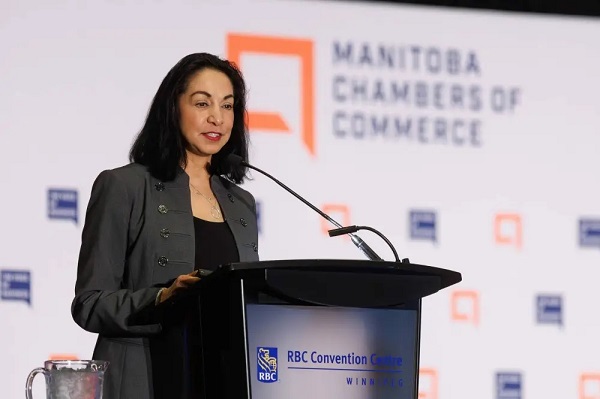Energy
Take Notice – Question the Net Zero Agenda, and You’re Out the Door

Former Manitoba Hydro CEO Jay Grewal Photo from the Winnipeg Free Press

The other week the CEO of Manitoba Hydro was ousted from her position by the utility’s NDP appointed Board of Directors. This story likely won’t get much attention outside of Manitoba, but it should. Why? Because it illuminates just how overzealous the Net Zero cult has become.
Now-former CEO Jay Grewal was appointed in 2019 as CEO of Manitoba Hydro under Brian Palliser’s Progressive Conservatives. Ms. Grewal is an accomplished executive with decades of experience and impeccable credentials. She was the utility’s first female CEO, and by all accounts handled her role well, “leading the utility through significant challenges, including two droughts, a severe snowstorm and the COVID-19 pandemic,” in the words of NDP Finance Minister Adrien Sala, who oversees Hydro.
So, what was the issue? Well, according to the Winnipeg Free Press, the NDP government decreed that Manitoba Hydro “chart a path to achieve a net-zero energy grid by 2035.” And Ms. Grewal, because she knows her brief, described that mandate as “not feasible.” That is, it can’t be done.
What did this quite sensible position, grounded in reality, get her? Fired.
The story goes that Ms. Grewal, speaking off the cuff at a public event, suggested the wind and solar build-out Manitoba Hydro had committed to was best financed privately, not through the public utility, given the huge costs and uncertainties involved. Daring to suggest private investment in the world of crown utilities is putting a red flag before a bull, and the NDP “crown ownership is sacrosanct” bull flew into a rage. This may have been the fatal mistake that made Grewal’s firing a sure thing. Minister Sala clamped down on that one right away, releasing a statement which said that “the NDP government expects new generating assets to be publicly owned.” Sorry tax-payers!
But why is there even discussion of a big solar and wind build out? Because that is part of the net zero mantra.
Manitoba Hydro is a large utility, delivering reliable electricity and gas energy to hundreds of thousands of Manitobans. And the province is not in great financial shape. According to a government report from December, Manitoba’s forecasted deficit has ballooned to over $1.6 billion. As it stands Manitobans pay 33 cents for every dollar of their Hydro bill to service interest on the NDP Hydro debt, according to Grant Jackson, PC shadow minister for Manitoba Hydro. The utility is key to the province’s long-term economic wellbeing. And the affordable, reliable power the utility delivers is key to getting Manitoba into better financial shape.
That doesn’t seem to matter much to Premier Kinew and his NDP government. What matters is adherence to the ideology. They don’t want a steady hand at the tiller, they want a green rubber stamp on all of their questionable decisions. A “Yes Man.” Or, in this case, a Yes Woman.
I suspect that Ms. Grewal went along with as much as she did against her better judgement. Her net zero comment shows that she’s a woman of sense. As does her suggestion that there be private-sector partners to help fund new projects.
But in the end, going along to get along didn’t do her or the province any good. “Give ‘em an inch, and they’ll take a mile,” is the old expression, and that’s always the way with green ideologues. Their demands are never ending, and before you know it, our way of life is fundamentally altered.
Leaders in business across Canada should take note of this episode, because it shows that it doesn’t work to feed the crocodile in the hope that he’ll eat you last. What Canada needs right now is men and women who will stand up and speak clearly, who are willing to say no to net zero and its economy-destroying demands.
Good for Ms. Grewal for speaking the truth. Hopefully the next time she does, she’ll add that the Net Zero madness is not only “unachievable” but “irresponsible” and “un-Canadian” as well.
Alberta
Nobel Prize nods to Alberta innovation in carbon capture

From the Canadian Energy Centre
‘We are excited to bring this made-in-Canada innovation to the world’
To the naked eye, it looks about as exciting as baking soda or table salt.
But to the scientists in the University of Calgary chemistry lab who have spent more than a decade working on it, this white powder is nothing short of amazing.
That’s because the material they invented is garnering global attention as a new solution to help address climate change.
Known as Calgary Framework-20 (CALF-20 for short), it has “an exceptional capacity to absorb carbon dioxide” and was recognized in connection with the 2025 Nobel Prize in Chemistry.
“It’s basically a molecular sponge that can adsorb CO2 very efficiently,” said Dr. George Shimizu, a UCalgary chemistry professor who leads the research group that first developed CALF-20 in 2013.
The team has been refining its effectiveness ever since.
“CALF-20 is a very exciting compound to work on because it has been a great example of translating basic science into something that works to solve a problem in the real world,” Shimizu said.
Advancing CCS
Carbon capture and storage (CCS) is not a new science in Alberta. Since 2015, operating projects in the province have removed 15 million tonnes of CO2 that would have otherwise been emitted to the atmosphere.
Alberta has nearly 60 proposed facilities for new CCS networks including the Pathways oil sands project, according to the Regina-based International CCS Knowledge Centre.
This year’s Nobel Prize in Chemistry went to three of Shimizu’s colleagues in Japan, Australia and the United States, for developing the earliest versions of materials like CALF-20 between 1989 and 2003.
Custom-built molecules
CALF-20 is in a class called metal-organic frameworks (MOFs) — custom-built molecules that are particularly good at capturing and storing specific substances.
MOFs are leading to new technologies for harvesting water from air in the desert, storing toxic gases, and capturing CO2 from industrial exhaust or directly from the atmosphere.
CALF-20 is one of the few MOF compounds that has advanced to commercial use.
“There has been so much discussion about all the possible uses of MOFs, but there has been a lot of hype versus reality, and CALF-20 is the first to be proven stable and effective enough to be used at an industrial scale,” Shimizu said.
It has been licensed to companies capturing carbon across a range of industries, with the raw material now being produced by the tonne by chemical giant BASF.
Carbon capture filter gigafactory
Svante Inc. has demonstrated its CALF-20-based carbon capture system at a cement plant in British Columbia.
The company recently opened a “gigafactory” in Burnaby equipped to manufacture enough carbon capture and removal filters for up to 10 million tonnes of CO2 annually, equivalent to the emissions of more than 2.3 million cars.
The filters are designed to trap CO2 directly from industrial emissions and the atmosphere, the company says.
Svante chief operating officer Richard Laliberté called the Nobel committee’s recognition “a profound validation” for the entire field of carbon capture and removal.
CALF-20 expansion
Meanwhile, one of Shimizu’s former PhD students helped launch a spinoff company, Existent Sorbents, to further expand the applications of CALF-20.
Existent is working with oil sands producers, a major steel factory and a U.S.-based firm capturing emissions from other point sources, said CEO Adrien Côté.
“The first users of CALF-20 are leaders who took the risk of introducing new technology to industries that are shrewd about their top and bottom lines,” Côté said.
“It has been a long journey, but we are at the point where CALF-20 has proven to be resilient and able to survive in harsh real-world conditions, and we are excited to bring this made-in-Canada innovation to the world.”
Business
Bill Gates walks away from the climate cult

Billionaire Bill Gates — long one of the loudest voices warning of climate catastrophe — now says the world has bigger problems to worry about. In a 17-page memo released Tuesday, the Microsoft co-founder called for a “strategic pivot” away from the obsessive focus on reducing global temperatures, urging leaders instead to prioritize fighting poverty and eradicating disease in the developing world. “Climate change is a serious problem, but it’s not the end of humanity,” Gates wrote.
Gates, 70, argued that global leaders have lost perspective by treating climate change as an existential crisis while millions continue to suffer from preventable diseases like malaria. “If I had to choose between eradicating malaria and preventing a tenth of a degree of warming, I’d let the temperature go up 0.1 degree,” he told reporters ahead of next month’s U.N. climate conference in Brazil. “People don’t understand the suffering that exists today.”
For decades, Gates has positioned himself as a leading advocate for global climate initiatives, investing billions in green energy projects and warning of the dangers of rising emissions. Yet his latest comments mark a striking reversal — and a rare admission that the world’s climate panic may have gone too far. “If you think climate is not important, you won’t agree with the memo,” Gates told journalists. “If you think climate is the only cause and apocalyptic, you won’t agree with the memo. It’s a pragmatic view from someone trying to maximize the money and innovation that helps poor countries.”
The billionaire’s change in tone is sure to raise eyebrows ahead of the U.N. conference, where climate activists plan to push for new emissions targets and wealth transfers from developed nations. Critics have long accused Gates and other elites of hypocrisy for lecturing the public about fossil fuels while traveling the globe on private jets. Now, Gates himself appears to be distancing from the doomsday rhetoric he once helped spread, effectively admitting that humanity faces more immediate moral imperatives than the weather.
(AP Photo/Alex Brandon)
Stunning Climate Change pivot from Bill Gates. Poverty and disease should be top concern.
-

 Crime2 days ago
Crime2 days agoCanada Seizes 4,300 Litres of Chinese Drug Precursors Amid Trump’s Tariff Pressure Over Fentanyl Flows
-

 Alberta1 day ago
Alberta1 day agoFrom Underdog to Top Broodmare
-

 Alberta2 days ago
Alberta2 days agoHow one major media torqued its coverage – in the take no prisoners words of a former Alberta premier
-

 Alberta2 days ago
Alberta2 days agoProvince orders School Boards to gather data on class sizes and complexity by Nov 24
-

 Business1 day ago
Business1 day agoCanada’s economic performance cratered after Ottawa pivoted to the ‘green’ economy
-

 Opinion2 days ago
Opinion2 days agoBill Gates Shakes Up the Climate Discussion
-

 Business2 days ago
Business2 days ago“We have a deal”: Trump, Xi strike breakthrough on trade and fentanyl
-

 Business1 day ago
Business1 day agoCanadians paid $90 billion in government debt interest in 2024/25




